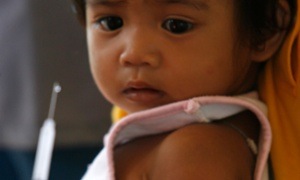
A government-funded public awareness campaign will help counter some “crackpot ideas” about vaccination, health minister Sussan Ley said as the government announced measures to boost the immunisation rate, including closing a loophole for religious exemption.
The social services minister, Scott Morrison, on Sunday announced that Christian Scientists, who are currently the only group to formally be granted an exemption to vaccination on religious grounds, will no longer be able to claim that exemption.
“The Coalition government last week announced an end to the conscientious objector exemption on children’s vaccination. Eligibility for payments will be dependent on children having met early childhood immunisation requirements,” Morrison said.
Parents who do not vaccinate their children will no longer be able to receive the childcare benefit and rebate, or the Family Tax Benefit part A supplement.
Labor stands with the government on the issue.
“I do support the push to make sure that the anti-vaccination brigade are not receiving family payments and I think we just need to work it through with religious organisations because the public health and safety of our children has to come first,” the Labor leader, Bill Shorten, said.
Closing the loophole for conscientious objectors is part of the government’s $26m package to boost the immunisation rate, which includes a new public health campaign and lifting the incentives payment to doctors from $6 to $12 to make sure children get their jabs on time.
Ley said the financial incentive recognises the extra burden placed on medical professionals in chasing up overdue vaccinations.
“There is an incentive to get vaccinations happening,” Ley told reporters on Sunday. “Two month is when the vaccination is late. It’s overdue and it is time to actually remind somebody to come in and get vaccinated with their children.
“What we have to recognise is this takes time, it takes resources, it takes a phone call.”
Ley said the public awareness campaign will help counter some of the misinformation on vaccination.
“I think the most important communication happens inside the doctor’s surgery. Doctors see patients regularly and they have a range of issues they talk to them about,” Ley said.
“We need to make sure that the information is available through general practitioners to explain to those parents who are hesitant, who are getting complex and complicated information and quite honestly, hearing some crackpot ideas about what happens if you vaccinate your children.”
Doctors groups have welcomed the funding for the campaign.
“There’s a lot of misinformation out on the internet, social media chat groups and the like and people are often lulled into not doing anything because they’re just confused,” the president of the New South Wales branch of the Australian Medical Association, Saxon Smith, told ABC TV on Sunday.
“Having these programs, whether they’re more punitive or not, you at least go to your family doctor and have that evidence-based discussion about the safety and importance that vaccination and immunisation brings to your child and the community,” he said.
The president of the Royal Australian College of General Practitioners, Frank Jones, said the campaign should target those not familiar with Australia’s vaccination program.
“It is important that the federal government’s broader communication and education campaign targets communities facing particular barriers to ensuring their children are vaccinated,” Jones said.
“These communities include new arrivals to Australia who may not be familiar with vaccination programs, Aboriginal and Torres Strait islander families and people who live in rural and remote areas with limited access to medical services.”
